牛津英语 小学总复习 介词
上海小学牛津英语语法归纳总结
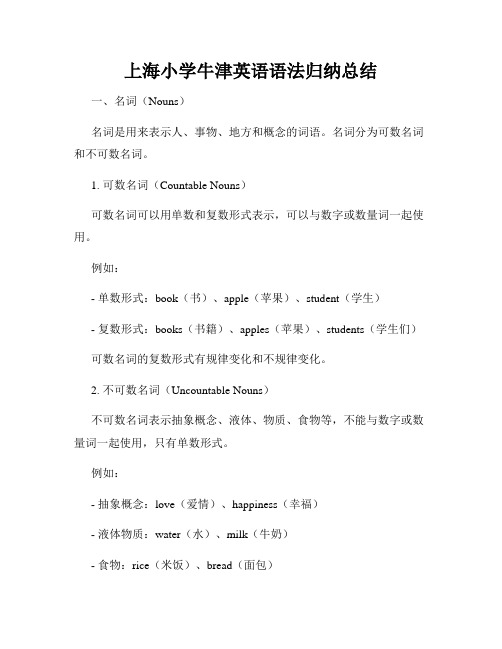
上海小学牛津英语语法归纳总结一、名词(Nouns)名词是用来表示人、事物、地方和概念的词语。
名词分为可数名词和不可数名词。
1. 可数名词(Countable Nouns)可数名词可以用单数和复数形式表示,可以与数字或数量词一起使用。
例如:- 单数形式:book(书)、apple(苹果)、student(学生)- 复数形式:books(书籍)、apples(苹果)、students(学生们)可数名词的复数形式有规律变化和不规律变化。
2. 不可数名词(Uncountable Nouns)不可数名词表示抽象概念、液体、物质、食物等,不能与数字或数量词一起使用,只有单数形式。
例如:- 抽象概念:love(爱情)、happiness(幸福)- 液体物质:water(水)、milk(牛奶)- 食物:rice(米饭)、bread(面包)不可数名词没有复数形式,不能直接与冠词a/an连用。
二、冠词(Articles)冠词用于限定名词的范围,分为定冠词和不定冠词。
1. 定冠词(Definite Article)定冠词是"the",用于特指已经提到的人或物,或者特指上下文中的某人或某物。
例如:- I saw a cat in the tree.(我看到树上有一只猫)- The cat was black.(那只猫是黑色的)2. 不定冠词(Indefinite Article)不定冠词有两种,分别是"a"和"an"。
用于泛指某一类人或物。
例如:- I have a dog.(我有一只狗)- She is an actress.(她是一名女演员)不定冠词"a"后面接辅音音素开头的词,"an"后面接元音音素开头的词。
三、形容词(Adjectives)形容词用来描述名词的特征和性质。
形容词通常位于名词之前。
- a big house(一个大房子)- a beautiful flower(一朵美丽的花)形容词可以用于比较级和最高级。
沪教版牛津英语小学1-5年级全部单词分类

.牛津上海版小学英语课本 (1-5 年级 ) 全部单词分类学校 Schoolshool 学校 [sku:l] n. uniform 制服;军服 ['ju:ni fɔ :m] n. term 学期;期限 [tə:m] n class 班级 [klɑ:s] n.b ook 书 [buk] n. pencil 铅笔 ['pensəl] n.bag 书包 [bæ ɡ ] n.pen 钢笔 [pen] n.ruler 尺子 ['ru:lə] n. pencil-case 铅笔盒 ['penslkeis] n. eraser 橡皮 [i'reizə] n. crayon 蜡笔 ['kreiən] n.sharpener 卷笔刀 [' ʃɑ: pənə] n.ink 墨水[iŋk] nlesson 功课;课程 ['lesən] n. paper 纸 ['peipə] n.text 课文;文本 [tekst] n brush 毛笔 [brʌʃ] n.have a lesson 上课Chinese book 语文书have lessons 上课young pioneer 少年先锋队员eye-exercises 眼保操s tudent (大中学)学生 ['stju:dənt] n classmate 同学 ['kl ɑ :smeit] n homework 家庭作业 ['həumwə:k] npupil 小学生 ['pjupəl] n. blackboard 黑板 ['blækb ɔ :d] nred scarf 红领巾playground 操场 ['plei ɡ raund] n exercise-book 练习本have English class 上英语课begin classes 开始上课talk in English 用英语讲paint 颜料 [peint] n morning exercises 早操timetable 课程表 ['taim,teibl] n teacher 教师 ['ti:tʃə] n.break 课间休息;休息 [breik] n felt pen 毡头笔 [felt] nnote 纸币;笔记 [nəut] ngo home 回家teacher’s desk 讲台seat 座位 [si:t] n class is over 下课了school is over. 放学了.课程 Subjectsubject 科目 [' sʌbdʒikt ] n. Chinese 语文 ['t ʃ ai'ni:z] n. English 英语['iŋgli ʃ] n. math 数学[mæ θ ] nscience 科学;技术 ['saiəns] n physical education 体育课['fizikəl] [,edjukei ʃ n] nart 美术 [ɑ:t] n.music 音乐 ['mju:zik] ntext 课文;文本 [tekst] n书 Bookpoem 诗 ['pəuim] n module 单元;组件 ['m ɔ dju:l] n unit 单元;单位 ['ju:nit] n word 单词;言辞;歌词 [wə:d] n page 页 [peid ʒ ] n letter 字母;文字 ['letə] nsheet 印刷品;表格 [ ʃ i:t] n vocabulary 词汇 [və'kæbjuləri] n grammar 语法 ['græmə] n dictionary 字典 ['dik ʃəneri]b ook 书 [buk] n. content 目录;内容 [kən'tent] n 身体 Bodybody 身体 ['b ɔ di] n. hair 头发[hεə] n.head 头 [hed] n. face 脸 [feis] n.hand 手 [hænd] n. mouth 嘴[mauθ] n.n ose 鼻子 [nəuz] n. ear 耳朵 [iə] n.eye 眼睛 [ai] n. finger 手指['fiŋ ɡ ə] n.a rm 胳膊 [ ɑ: m] n.feet 脚(复数) ['fi:t] n.foot 脚 [fut] n. stomach ['stʌmək] n.throat 喉咙[θrəut] n. teeth 牙 ( 复数) [ti:θ] ntooth 牙齿[tu:θ] n.toe 脚趾 [təu] n.leg 腿 [le ɡ ] n. knee 膝盖 [ni:] n..back 后背 [bæk] n bone 骨头 [bəun] n颜色 colourcolour 颜色 ['kʌlə] n. red 红色的 [red] adj. yellow 黄色的 ['jeləu] adj. green 绿色的 [ ɡ ri:n] adj. blue 蓝色的 [blu:] adj. purple 紫色的 ['pə:pl] adj. white 白色的 [hwait] adj. black 黑色的 [blæk] adj. orange 橙色的 [ 'ɔ rin dʒ ] adj. pink 粉色的[piŋk] adj.b rown 棕色的 [braun] adj. grey 灰色的 [ɡrei] adj.动物 Animalanimal 动物 ['æniməl] n dog 狗 [dɔɡ] n. cat 猫;猫科动物 [kæt] n. kitty 小猫 ['kiti:] n.puppy 小狗 ['p ʌ pi] n rabbit 兔子 ['ræbit] n.duck 鸭子 [dʌk] n. hare 野兔[h εə ] nduckling 小鸭 ['d ʌkliŋ] n pig 猪 [pi ɡ ] n.parrot 鹦鹉 ['pærət] n bear 熊[bεə] n.bird 鸟;禽 [bə:d] n. bee 蜜蜂,勤劳的人 [bi:] n. elephant 大象 ['elifənt] n. mouse 老鼠 [maus] n.squirrel 松鼠 ['skwə:rəl] n. monkey 猴子;顽童 ['m ʌŋki] n. swan 天鹅 [sw ɔ n] n giraffe 长颈鹿 [dʒi'rɑ:f] n. zebra 斑马;有斑纹的 ['zi:brə] n lizard 蜥蜴 ['lizəd] nfox 狐狸;狡猾的人 [f ɔ ks] n panda 熊猫 ['pændə] n. crocodile 鳄鱼 ['krɔkə,dail] n. chick 小鸡 [tʃik] n.cow 母牛 [kau] n chicken 鸡 ['tʃikin] n. dinosaur 恐龙 ['dainəs ɔ :] n donkey 驴;傻瓜 ['d ɔŋki] n dragon 龙 ['dræɡən] n.snake 蛇 [sneik] n.lion 狮子;勇敢的人 ['laiən] n tiger 老虎;凶残的人 ['tai ɡ ə] n owl 猫头鹰 [aul] n fish 鱼 [fiʃ] n.sheep 羊;害羞的人 [ ʃ i:p] n tortoise 乌龟 [ 'tɔ: təs] npet 宠物;宝贝 [pet] n kangaroo 袋鼠[,kæŋgə'ru:] n caterpillar 毛虫;蝶 ['kætə,pilə] n butterfly 蝴蝶 ['bʌtəflai] n. dolphin 海豚 ['d ɔ lfin] n moth 蛾;蛀虫 [m ɔθ] n goose 鹅 [ ɡ u:s] n frog 青蛙 [fr ɔɡ ] ntadpole 蝌蚪 ['tædpəul] n geese 鹅 ( 复数 ) [ ɡ i:s]wolf 狼 [wulf] n seal 海豹 [si:l] nhorse 马 [h ɔ :s] n shark 鲨鱼 [' ʃɑ: k] ncocoon 茧;卵袋 [kə'ku:n] n 食物 Food feeler 触角;触须 ['fi:lə] n insect 昆虫 ['insekt] nfood 食物 [fu:d] n. vegetable 蔬菜 ['vedʒitəbl] n. fruit 水果 [fru:t] n. drink 饮料[driŋk] nbread 面包 [bred] n cake 蛋糕 [keik] nBigMac 巨无霸 n. hot dog 热狗McChicken 麦香鸡 n sausage 香肠 ['s ɔ :sid ʒ ] n hamburger 汉堡包 ['hæmbə: ɡ ə] n chicken 鸡肉 ['t ʃ ikin] n French fries 榨薯条 [frent ʃ fraiz] n. chocolate 巧克力 ['t ʃɔ kəlit] n crisp 松脆饼干;薯片 [krisp] n. Coke 可乐 [kəuk] nwater 水 ['w ɔ :tə] n tea 茶 [ti:] n milk 牛奶 [milk] njuice 果汁;汁 [d ʒ u:s] ncoffee 咖啡 ['k ɔ fi] n egg 蛋 [e ɡ ] nrice 米饭 [rais] n jam 果酱 [d ʒ æm] n.noodles 面条(通常复数 ['nu:dl] n carrot 胡萝卜;红头发 ['kærət] n.tomato 番茄 [ tə'mɑ:təu] n.potato 马铃薯 [pə'teitəu] n cabbage 卷心菜 ['kæbid ʒ ] n honey 蜂蜜 ['h ʌ ni] napple 苹果 ['æpl] n bean 豆 [bi:n] n.pear 梨[pεə] n pineapple 菠萝;凤梨 ['pain,æpl] n orange 橘子 ['ɔrindʒ ] n banana 香蕉 [bə'nɑ:nə] n . watermelon 西瓜 ['w ɔ :tə,melən] n grape 葡萄;葡萄酒 [greip] n lime 酸橙;菩提树 [laim] n plum 梅子;洋李 [pl ʌ m] a butter 黄油;奶油 ['b ʌ tə] n durian 榴莲 ['djuəriən] nsugar 糖 [' ʃ ugə] n flour 面粉;粉状物质 [flauə] n corm 谷物 [k ɔ :m] n salt 盐 [s ɔ :lt] n数字 Numbernumber ['nʌmbə] n. one 一 [w ʌ n] num.two 二 [tu:] num. three 三[θri:] num.four 四 [f ɔ :] num. five 五 [faiv] num.six 六 [siks] num. seven 七 ['sevən] num.eight 八 [eit] num. nine 九 [nain] num.ten 十 [ten] num. eleven 十一 [i'levən] num. twelve 十二 [twelv] num. thirteen 十三['θə:'ti:n] num. fourteen 十四 ['fɔ:'ti:n] num. fifteen 十五 ['fifti:n] num.sixteen 十六 ['siks'ti:n] num. seventeen 十七 [,sevən'ti:n] num. eighteen 十八 ['ei'ti:n] num. nineteen 十九 [,nain'ti:n] num. twenty 二十 ['twenti] num. thirty 三十['θə:ti] num.forty 四十 ['fɔ:ti] num. fifty 五十 ['fifti] num.sixty 六十 ['siksti] num. seventy 七十 ['sevənti] num. eighty 八十 ['eiti] num. ninety 九十 ['nainti] num..hundred 一百 ['hʌndrəd] num. thousand 一千['θauzənd] num.twenty-five 二十五 numfirst 第一;首先 [fə:st] num second 第二 ['sekənd] numthird 第三[θə:d] num fourth 第四 [f ɔ:θ] numfifth 第五[fif θ ] num sixth 第六[siks θ ] numseventh 第七['sevn θ ] num eighth 第八[eit θ ] numninth 第九[nain θ ] num tenth 第十[ten θ ] numeleventh 第十一[i'levn θ ] num twelfth 第十二[twelf θ ] num twentieth 第二十['twentii θ ] num thirtieth 第三十['θə:tii θ ] numtwenty-first 第二十一 [,twenti'fə:st] num 冠词 Articlea 一 [ei] art. an 一 [ən] artthe 这,那 [[ði]] art.Be 动词am ( 我 ) 是 [æm] v.is (他,她,它)是 [ iz ] v. 主格 NominativeI 我 [ai] pron.he 他 [hi: ] pron.we 我们 [wi:] pron.宾格 O bjective Caseme 我 [mi:] pronhim 他 [him] pronus 我们 [ʌs] pron形容词性are ( 你,你们,我们,他们,她们,它们 ) 是 [ ɑ :] v.you 你,你们 [ju:] pron.she 她 [ʃi:] pron.they 他 ( 她;它 ) 们 [ðei] pron. it 它 [it] pron.you 你,你们 [ju:] pron.her 她 [hə:] pronthem 他 ( 她;它 ) 们 [ðem] pron it 它 [it] pron.your 你的;你们的 [jɔ: ] pron.物主代词my 我的 [mai] pronhis 他的 [hiz] pronour 我们的 ['auə] pron名词性物主代词mine 我的 [main] pronhis 他的 [hiz] pronours 我们的 ['auəz] pron反身代词myself 我自己 [mai'self] pron.itself 它自己 [it'self]pron.herself 她自己 [hə:'self] pron.himself 他自己 [him'self] pron.介词 prepositionrom 从……[fr ɔ m] prep.about 关于 [ə'baut] prep.above 在…… 上方 [ə'b ʌ v] prep. behind 在…… 后面 [bi'haind] prep. down 向下 [daun] prep. 或 ad.after 在… 后面 [' ɑ :ftə] prep.before 在…… 之前 [bi'fɔ:] prep.like 像 [laik] prep.beside 在…… 旁边 [bi'said] prep. between 在 ( 两者 ) 之间 [bi'twi:n] prep her 她 ( 宾格 ) [hə:] prontheir 他 ( 她;它 ) 们的[ðεə] pronits 它的 [its] pronyours 你的;你们的 [juəz] pronhers 她的 [hə:z] prontheirs 他 ( 她;它 ) 们的[ðєəz] pron its 它的 [its] pronyourself 你自己 [jɔ:'self] pron.yourselves 你们自己 [jɔ:'selvz] pron. themselves 他们自己 [ðəm'selvz] pron. ourselves 我们自己 [,auə'selvz] pron. self 自己;自我;本质 [self] nin 在…… 之内 [in] prep.into 到…… 里 ['intu: ] prep.at 在 ... ;在…… 时 [æt] prep.to 到;向 [tu: ] prep.by 在… 旁;靠近 prep.on 在…… 之上(时候) [ɔn ] prep. under 在…… 下面 [' ʌ ndə] prepplus 加 [plʌs ] prep.minus 减 'mainəs] prep.inside 在…… 里面 [in'said] prep outside 在…… 外面 ['aut'said] prep away 离…… ;外出 [ə'wei]near 靠近 [niə] prep.up 向上;上升;在…… 上面[ ʌ p] prep. 或 ad.come in. 进来 ['k ʌ m in] out 向外 [aut] prep.out 通过…… 而出 [aut] prep 介词短语from beijing 从北京来的over there 在那边go to the door 到门那儿去in front of 在… 前面out of 向 ( 在)… 外面wait for 等候it's time for 是… 的时候了play with 玩…be afraid of 害怕so much like 很像at the back 在后面pick up 拾起next to 与…… 相邻 [nekst] 地点 Placesshool 学校 [sku:l]n.park 公园 [pɑ:k] nhome 家 [həum]n.house 房屋 [haus]n.room 房间 [ru:m] n. over 越 ( 过 ) ['əuvə] prep.for 为;代替;因为;为得到 [ f ɔ :] prep with . 用;和… 在一起 [wið ] prep. through 穿过[θru:] prepat the zoo 在动物园里at three 在三时;在三点at home 在家look at 看……a lot of 许多…a pair of trousers 一条裤子of course 当然 [k ɔ :s]look for 寻找hurry up! 快点!run away 跑掉by underground 乘地铁try on 试穿put into 放到… 里listen to 听……library 图书馆 ['laibrəri] nzoo 动物园 [zu:] ncinema 电影院 ['sinəmə] nfactory 工厂 ['fæktəri] nsquare 广场[skwεə] ncrossing 十字路口 ['kr ɔ:siŋ] n bedroom 卧室 ['bedrum] n.classroom 教室 ['kl ɑ : srum] n bathroom 浴室['bæθrum] n kitchen 厨房 ['kit ʃ in] n bookstore 书店 ['bukst ɔ :] n sitting room 起居室study 书房 ['st ʌ di] ntheatre 剧场['θiətə] n restaurant 餐厅 ['restər ɔ nt] n road 路;街道 [rəud] nbeach 海滩 [bi:t ʃ ] nfarm 农场 [fɑ:m] njungle 丛林 ['d ʒʌŋgl] nblock 大楼;大厦 [bl ɔ k] n palace 宫殿 ['pælis] n国家 Nationnation 国家 ['neiʃən]n.China 中国 ['t ʃai nə] n America 美国;美洲 [ə'merikə] n England 英国 ['inglənd] n Russia 俄罗斯 ['rʌʃə]n. motherland 祖国 ['m ʌ ðəlænd] n 星期 Weekweek 周,星期 [wi:k]n. Tuesday 星期二 ['tju:zdi ] n Thursday 星期四['θə:zdi] n living room 客厅dining room 餐室;餐厅 nhall 食堂,会堂 [hɔ:l]n.supermarket 超市 ['sju:pə,mɑ:kit]police station 警署;派出所station 车站;电台;基地 ['stei ʃən] n tower 塔;高楼 ['tauə] ntemple 庙宇;圣堂;寺院 ['templ] n country park 乡村公园 ['k ʌ ntri]garden 花园;菜园;游乐场 ['gɑ:dn] n castle 城堡 ['kɑ:sl] ncage 笼子;监牢 [keid ʒ ] nnational 国家的 ['næ ʃənəl] adj.Chinese 中国的;汉语;中国人 ['t ʃ ai'ni:z] Amercian 美国的;美国人 [ə'merikən] English 英国的;英语;英国人['iŋgli ʃ ] Russian 俄语 , 俄国人 ['r ʃən]capital 首都 ['kæpitəl] nthe capital of China 中国首都national flag 国旗 [flæɡ]Monday 星期一 ['m ʌ ndi] nWednesday 星期三 ['wenzdei ] nFriday 星期五 ['fraidi] nSunday 星期天 ['s ʌ ndi] nJanuary 一月 ['d ʒ ænjueri] n.Saturday 星期六 ['sætədi] n月份 Monthmonth 月 [mʌnθ] n.February 二月 ['februəri] nApril 四月 ['eiprəl] nJune 六月 [d ʒ u:n] nAugust 八月 [ ɔ :'g ʌ st] n October 十月 [ ɔ k'təubə] n季节 Seasonseason 季节 ['si:zn] nsummer 夏天 ['sʌmə]n.fall 秋天 [f ɔ :l] n衣服 Clothesclothes 衣服 [klɔθ ] ncap 帽子 [kæp] nshirt ( 男式 ) 衬衫 [ ʃə:t] nscarf 围巾,领巾 [skɑ:f] nT-shirt T 恤衫pants 长裤 [pænt] nsize 大小;尺寸;号码 [saiz] n trousers 裤子;长裤 ['tr au zəz] n glove 手套 [g lʌ v] n职业 Jobjob 职业 [dʒɔb]n.peasant 农民 ['pezənt] n March 三月 [mɑ:t ʃ ] nMay 五月 [mei]n.July 七月 [d ʒ u:'lai] nSeptember 九月 [sep'tembə] n November 十一月 [nəu'vembə] n December 十二月 [di'sembə] n spring 春天[spriŋ] nautumn 秋天 ['ɔ:təm]n.winter 冬天 ['wintə]n.wear 穿戴[wεə] n. 或 v.coat 上衣 [kəut] nblouse ( 女式 ) 衬衫 [blauz] nskirt 裙子;边缘;外围 [skə:t] n jacket 外衣;夹克;皮 ['d ʒ ækit] n dress 连衣裙 [dres] njeans 牛仔裤;斜纹棉布 [ dʒi :n] n sock(s) 袜子(复数) [ sɔk ] nmask 面具;遮蔽物;口罩 [ mɑ: sk] n shoe(s) 鞋子(复数) [ ʃ u:] nwork 工作 [wə:k] n. 或 v.farmer 农民 ['fɑ:mə] nartist 画家;艺术家 ['ɑ:tist] n teacher 教师 ['ti:t ʃə] nstudent 学生 ['stju:dənt]n.model 模型;模特;模范 ['m ɔ dl] n.doctor 医生;博士 ['d ɔ ktə] n scientist 科学家 ['saiəntist] n nurse 护士 [nə:s] nwriter 作家 ['raitə] nengineer 工程师 [,end ʒ i'niə] n policeman 男警察 [pə'li:smən] n cleaner 清洁工 ['kli:nə] n accountant 会计 [ə'kauntənt] n driver 司机 ['draivə] ndentist 牙医 ['dentist] ncook 厨师 [kuk] npostman 邮递员 ['pəustmən] n waiter 服务员(男) ['weitə] n diver 跳水者;潜水员 ['daivə] n soldier 士兵;兵蚁 ['səuld ʒə] n 家庭 Familyfamily 家庭;家族 ['fæmili] n family tree 家谱 [tri:]mother 母亲 ['mʌðə]n.dad 爸爸(口语) [dæd] n father 父亲 ['fɑ:ðə]n.son 儿子;女婿 [s ʌ n] naunt 姑姑;婶;姨 [ɑ:nt] n sister 姐妹 ['sistə] ncousin 堂兄弟姐妹 ['kʌzən]n. actress 女演员 ['æktris] nactor 男演员 ['æktə] npolicewoman 女警 [pə'li:s,wumən] n salesperson 销售员 ['seilz,pə:sən] nTV reporter 电视台记者 [ri'p ɔ :tə] fireman 消防员 ['faiəmən] nsinger 歌唱家;歌手 ['sind ʒə] npilot 飞行员;舵手 ['pailət] n waitress 女服务员 ['weitris] nzoo keeper 饲养员 ['ki:pə] nshop assistant 营业员 [ə'sistənt] n ambulance (man) 急救员 ['æmbjuləns] n love 爱 [l ʌ v] nfamily member 家庭成员 ['membə] n parents 父母['pєərənts] nmum 妈妈(口语) [m ʌ m] n grandpa 爷爷;外公 ['grændpɑ:] n grandma 奶奶;外婆 ['grændmɑ:] n daughter 女儿;媳妇;妇女 ['d ɔ :tə] n uncle 叔叔舅舅姨夫姑父 [' ʌŋkl] n brother 兄弟 ['brʌðə] n.nephew 侄子;外甥 ['nefju:]n.man 男子 [mæn] nmen 男子(复数) [ men] nwoman 妇女 ['wumən] n.niece 侄女;外甥女 [ni:s]n.人 Peoplepeople 人 ( 复数 ) ['pi:pl]n. friend 朋友 [frend] nchild 小孩 [t ʃ aild] nchildren 小孩(复数 ['tʃildrən]n. baby 婴儿;幼畜 ['beibi] nMiss 女士;小姐;少女 [mis] n Mr. 先生 (mister 缩写 ) ['mistə] n Mrs. 太太,夫人 ['misiz]n.运动 Sportsports 体育运动 [sp ɔ :ts] n basketball 篮球 ['bæskitb ɔ :l] n volleyball 排球 ['vɔlibɔ:l]n. soccer 英式足球 ['sɔkə]n.bat 球拍 ; 击球 [bæt] n天气 Weatherweather 天气 ['weðə] n.sun 太阳 [s ʌ n] nsky 天空 [skai] nstar 星星 [stɑ:] ncloud 云 [klaud] nrain 雨;下雨 [rein] n raindrop 雨点 ['reindr ɔ p] n snow 雪;下雪 [snəu]n. women 妇女 ['wimin]n.boy 男孩;儿子;小儿子 [b ɔ i] n girl 女孩;女儿 [ɡə:l] nMr. and Mrs. white 怀特先生和夫人lady 女士;夫人;小姐 ['leidi] n gentleman 先生,绅士 ['dʒentlmən]n tennis 网球 ['tenis]n.tabletennis 乒乓球pingpong 乒乓球;桌球['piŋp ɔŋ] n badminton 羽毛球 ['bædmintən]n. football 足球;橄榄球 ['futb ɔ :l] n earth 地球 [ə:θ]n.air 空气;天空;气氛[εə] n moon 月亮;月光 [mu:n] nsunny 晴朗的 ['s ʌ ni] adj.moon 月亮 [mu:n]n.cloudy 多云的 ['klaudi]n.rainy 雨天;多雨的 ['reini] adj. rainbow 彩虹 ['reinbəu] nsnowy 下雪的 ['snəui] adj.windy 有风的;风大的 ['windi] adj. stormy 暴风雨的 ['stɔ:mi]n. lightning 闪电['laitniŋ]n.lunch 午餐 [l ʌ nt ʃ ] ndinner 晚餐 ['dinə]n..wind 风 [wind]n.storm 暴风雨 [st ɔ :m] nthunder 雷;雷声['θ ʌ ndə] n餐 Mealmeal 一餐 [mi:l]n.breakfast 早餐 ['brekfəst] n supper 晚饭;晚餐会 ['s ʌ pə] n dessert 甜点;餐后甜点 [di'zə:t] n have breakfast 吃早饭家具 Furniturefurniture 家具 ['fə:nitʃə]n.wall 墙 [w ɔ :l] nchair 椅子 [t ʃɛə] ndoor 门;出口 [d ɔ :] nsofa 沙发;长椅 ['səufə] nroof 屋顶;车顶 [ru:f] n一些名词box 盒子 [b ɔ ks] numbrella 伞 [ ʌ m'brelə] nbottle 瓶;酒 ['b ɔ tl] n newspaper 报纸 ['nju:s,peipə] n key 钥匙 [ki:] nspoon 勺子 [spu:n] nplate 盘子 [pleit] nscrewdriver 螺丝刀 ['skru:,draivə] dish 碟子;盘子 [di ʃ ] ndining 进餐['dainiŋ] neat breakfast 吃早饭 [i:t] ['brekfəst] bench 长凳 [bent ʃ ] nfloor 地板 [fl ɔ :] nwindow 窗 ['windəu] ncupboard 小厨;碗柜 ['k ʌ bəd] n shelf 书架 [ ʃ elf] ntable 桌子 ['teibl] nknife 小刀;手术刀;匕首 [naif] n glass 玻璃杯 [ɡlɑ:s] ncup 杯子;奖杯 [k ʌ p] nboard 写字板;牌子;伙食 [b ɔ :d] n chopsticks 筷子(复数) ['t ʃɔ pstik] n fork 叉子;岔口 [f ɔ :k] nbrush 刷 ( 子 ) [br ʌʃ ] ncushion 靠垫;坐垫 ['ku ʃən] n scissors 剪刀 ['sizəz] nglue 胶水 [glu:] nshaker 搅拌器 [' ʃ eikə] nglasses 眼镜;双筒望远镜 ['gl ɑ :siz] n packet 小包 ['pækit] nsunglasses 太阳镜 ['s ʌ nglɑ:siz] n sketchbook 写生簿 ['sket ʃ buk] ndoll 玩具娃娃 [d ɔ l] n.bell 铃 , 铃声 [bel] n.bin 垃圾箱;容器 [bin] n hammer 锤子;链球 ['hæmə] n mirror 镜子;榜样 ['mirə] nphone 电话 [fəun]n.hoop 呼啦圈;戒指 [hu:p] n telephone 电话 ['telifəun] n. watch 手表; [w ɔ t ʃ ] nbasket 筐 ['bɑ:skit] ntoy car 玩具车clock 钟 [kl ɔ k] nparty 聚会;党派 ['pɑ:ti] n skateboard 滑板 ['skeitb ɔ :d] n puppet 木偶;傀儡 ['p ʌ pit] n parcel 小包;包裹 ['pɑ:sl] n tape 胶带;带子;磁带 [teip] n swing 荡;荡秋千[swiŋ] vdrill 钻头钻床 [dril] nbell 铃;门铃 [bel] nrope 绳子 [rəup] nname 名字 [neim] nnew 新的;新闻 [nju:] n money 钱;收入 ['m ʌ ni] n picture 图画;照片 ['pikt ʃə] n lake 湖 [leik] n map 地图 [mæp] nmodel plane 模型飞机model ship 模型轮船toy 玩具;玩物 [t ɔ i] nrug 小地毯 [r ʌ g] npuzzle 拼图板;猜谜 ['p ʌ zl] nbar 栅栏 [bɑ:] nstring 绳子;线[striŋ] ndiary 日记;日记簿 ['daiəri] nballoon 气球 [bə'lu:n] ntype 类型;样式;榜样 [taip] nexpression 表达;表现力;表情 [iks'preʃən] n project 方案;计划 [prə'd ʒ ekt] nriver 河流;巨量 ['rivə] nmountain 山;山脉 ['mauntin] nlight 灯;光;火花;眼神 ['lait] nlamp 灯 [læmp]n.robot 机器人 ['r ɔ bət] npool 池 [pu:l] nswimming-pool 游泳池ground 地面 [gra ʊ nd] nbasin 盆;脸盆 ['beisən] nchess 西洋棋 [t ʃ es] nbirthday 生日 ['bə:θdei] nhobby 爱好 ['h ɔ bi] n.way 路;路程 [wei] nletter 信 ['letə] nMatch 比赛;对手 [mæt ʃ ] n game 游戏 [ɡeim] nquestion 问题 ['kwest ʃən] n news 消息;新闻 [nju:z] nnest 鸟巢 [nest] nrace 比赛 [reis] nfun 乐趣;娱乐 [f ʌ n]group 组;小组 [gru:p] nskate 滑冰(鞋) [skeit] n hiking 徒步旅行['haikiŋ] n vshell 贝壳;果壳 [ ʃ el] n computer game 电脑游戏number 号;号码 ['n ʌ mbə] n photo 照片 ['fəutəu] nfront 前面;前部;正面 [fr ʌ nt] n pioneer 先锋 [,paiə'niə] nstream 河;溪 [stri:m] naviary 鸟巢禽舍 ['eiviəri] n stone 石头 [stəun] nhole 洞;孔眼 [həul] nrock 石头;磐石 [r ɔ k] nisland 岛;安全岛 ['ailənd] n picnic 野餐 ['piknik] n comic book 漫画 ['k ɔ mik] [buk]noise 噪声 [n ɔ iz] nlife 生命;生活 [laif] npicture-book 图画书post card 明信片 [pə u st] [kɑ:d] n matter 事情;麻烦 ['mætə] ncomic 连环图画;喜剧的 ['k ɔ mik] n wave 浪;波浪 [weiv] nfire 火 [faiə] nfountain 喷水池;泉水 ['fauntin] n rubbish 垃圾;废话 ['r ʌ bi ʃ ] npen friend 笔友thing 东西;事情[θiŋ] ntop 顶部;头顶;山顶 [t ɔ p] nbottom 底部 ['bɔtəm]n.aquarium 水族馆;鱼缸 [ə'kw ɛəriəm] n way(= method) ['meθəd] 方法 ngoal 得分;守门员 [gəul] nscore 得分;起跑线;终点线 [sk ɔ :] n elf 小精灵;顽皮的孩子 [elf] npop 流行;流行音乐 [p ɔ p] ngrass 草;草坪 [grɑ:s] nlawn 草坪 [lɔ:n]n.painting 绘画['peintiŋ]nocean 海洋 ['əu ʃən] n.wing 翅膀[wiŋ] npond 水池;池塘 [p ɔ nd] n millimeter 毫米;公厘 ['mili,mi:tə] a shadow 影子;阴影 [' ʃ ædəu] n wood 木材 [wud]n.hay 干草 [hei] nlog 原木;木材 [l ɔ g] nroom 房间 [ru:m] nrule 规则 [ru:l] n植物 Plantplant 植物 [plɑ:nt]n.branch 树枝 [brɑ:nt ʃ ] nstalk 主茎 [st ɔ :k] nseed 种子 [si:d] n家用电器computer 计算机 [kəm'pju:tə] nTV 电视radio 收音机;电台 ['reidiəu] n乐器 Instrumentinstrument 乐器 ['instrumənt] violin 小提琴 [vaiə'lin] ndrum 鼓 [dr ʌ m] n交通 Traffictraffic 交通 ['træfik] nstop 停车站 [st ɔ p] n sale 打折销售;出售 [seil] n invitation 请帖 [,invi'tei ʃən] n flower 花 ['flauə] ntree 树 [tri:] ntrunk 树干;大皮箱 [tr ʌŋk] n sprout 苗;芽 [spraut] nsoil 土壤 [s ɔ il] nfan 扇子;电扇;螺旋桨 [fæn] n fridge 冰箱 [frid ʒ ] nvideo 录像机 ['vidiəu]n.triangle 三角铁['traiæŋgl] npiano 钢琴 [pi'ænəu] nrecorder 八孔直笛 [ri'k ɔ :də] n guitar 吉他 [gi'tɑ:] ntraffic light 红绿灯 [lait]traffic rule 交通规则 ru:l]traffic jam 塞车 [dʒæm]rolley-bus 无轨电车 ['tr ɔ lib ʌ s] n underground. 地铁 [' ʌ ndəgraund] n spaceship 宇宙飞船 ['speis ʃ ip] n bike 自行车 [baik]n.bicycle 自行车 ['baisikl]n.boat 小船 [bəut] nbus 公交车 [bʌs]n.wheel 轮子;车轮 [hwi:l] n.sign 指示牌;手势 [sain] aeroplane 飞机 [' ɛərəplein] n motorbike 摩托车 ['məutəbaik] n tram (有轨)电车 [træm] n plane 飞机 [plein] ncar 小汽车 [kɑ:] nship 轮船 [ʃip]n.bus stop 公共汽车站 [st ɔ p] ferry 摆渡 ['feri]n.lorry 卡车 ['l ɔ :ri] n一些形容词long 长的 [l ɔŋ] atall 高的 [t ɔ :l] ayoung 年轻的 [j ʌŋ] aold 年老的 [əuld] agood 好的 [ɡud] nbad 坏的 [bæd]n.right 对的 ; 右边的 [rait] a nfat 胖的;厚的 [fæt] athick 厚的[θik]n.open 开;开阔的 ['əupən] v quiet 安静的 ['kwaiət] anoisy 嘈杂的 ['nɔizi]a.heavy 重的;沉重的 ['hevi] a early 早 , 早的 ['ə:li] a engine 引擎;发动机 ['end ʒ in] n short 短的;矮的 [ ʃɔ :t] ahigh 高的 [hai] abig 大的 [biɡ] asmall 小的 [sm ɔ :l] aclean 清洁的 [kli:n] adirty 脏的 ['də:ti]n.wrong 错误的 [rɔŋ]n.left 左边的thin 瘦的;薄的[θin]n.strong 健壮的;坚固的 [str ɔŋ] a cold 寒冷的 [kəuld] ahot 热的 [hɔt]a.warm 暖和的 [w ɔ :m] acool 凉爽的 [ku:l] alate 晚的 [leit]a.close 近的 [kləuz]a.full 满的,饱的 [ful]a.thirsty 口渴的['θə:sti]a.excited 兴奋的 [ik'saitid] a bored 无聊的;烦人的 [b ɔ :d] a angry 生气的['æŋgri] ahard 硬的 [hɑ:d]a.low 轻声的,低的 [ləu]a.sour 酸的 ['sauə]a..far 远的 [fɑ:] aempty 空的 ['empti] ahungry 饿的 ['hʌŋɡri]a.tired 疲劳的;累的 ['taiəd] a happy 高兴的 ['hæpi] asad 忧伤的;悲伤的 [sæd] a bright 明亮的;开朗的 [brait] a dark 黑暗的 ['dɑ:k]a.soft 柔软的 [s ɔ ft] aloud 响的 [laud] asweet 甜的;悦耳的 [swi:t] a bitter 苦的 ['bitə]a.dry 干的,干旱的 [drai] a brave 勇敢的 [breiv] nlarge 大的 [lɑ:d ʒ ] abig 大的 [biɡ]a.giant 巨人的,巨人 ['d ʒ aiənt] n blind 瞎的 [blaind] nround 圆的 [raund] ablunt 钝的 [bl ʌ nt] aclever 聪明的 ['klevə]wise 聪明的 [waiz]smart 聪明的young 年轻的 [jʌŋ]ugly 丑的 [' ʌ gli] a salt 咸的 [sɔ:lt]a.wet 潮湿的 [wet]a.dear 亲爱的;可爱的 [diə] a small 小的 [smɔ:l]a.deaf 聋的 [def]a.dumb 哑的 [dʌm]busy 忙 ['bizi] asharp 锋利的 [ʃɑ:p]foolish 愚蠢的,傻的 ['fu:liʃ] stupid 愚蠢的 ['stju:pid]old 旧的,老的 [əuld] anew 新的 [nju:]nice 美好的 [nais]beautiful 漂亮的 ['bju:tiful] dangerous 危险的 ['deind ʒərəs] a safe 安全的 [seif]same 相同的 [seim] adifferent 不同的 ['difərənt] a favorite 特别喜爱 ['feivərit] a oral 口试 [' ɔ :rəl] nshiny 光亮的;闪耀的 [' ʃ aini] a healthy 健康的['helθi]a.slow 慢的 [sləu]a.quick 快的 [kwik]a.every 每个的 ['evri] a.cheap 便宜的 [t ʃ i:p] adear 昂贵的;珍贵的 [diə] a asleep 睡着的 [ə'sli:p] aawake 醒着的 [ə'weik]rough 粗糙的 [r ʌ f] asmooth 光滑的 [smu:ð]sore 疼的 [s ɔ ] adaily 每日的;日常的 ['deili] a sure 当然;一定 [ ʃ uə] awell 健康的 [wel] aafraid 害怕的 [ə'freid] afast 快 [fɑ:st] alittle 少许;一点点;幼小 ['litl] a only 只有;仅仅 ['əunli] a much 大量的 [mʌtʃ]a.some 一些 [səm]a.fluffy 蓬松的 ['fl ʌ fi] a病痛 Illnesshurt 疼痛 [hə:t] n vhave a fever 发烧 [hæv] ['fi:və] have a headache 头疼 ['hedeik] 形状 Shapeshape 形状 [ʃeip]n.circle 圆 ['sə:kl]n.square 正方形[skwεə]n. straight 成直线的 [streit] amany 大量的 [mʌtʃ]a.any 任何的,所有的 ['eni]a.sick 有病的 [sik] aill 生病的,坏的 [il]a.last 上一个的;仅余的;最后的 [lɑ:st] musical 音乐的 ['mju:zikəl] ahave a cold 感冒 [kəuld]have a toothache 牙疼['tu:θeik]have a stomachache 胃疼 ['stʌməkeik] have a sore throat 喉咙疼 [s ɔ:] [θrəut] oval 椭圆形 ['əuvəl]n.star 星 [stɑ:]n.triangle 三角形['traiæŋɡl]n.angle 角度,角['æŋɡl]n.date 日期 [deit] nseason 季节 ['si:zən]n.month 月 [m ʌnθ] nday 一天,白天 [dei]n.today 今天 [tə'dei] ntomorrow 明天 [tə'mɔrəu]n.the day after tomorrow 后天noon 中午 [nu:n]n.evening 傍晚;晚上['i:vniŋ] n midnight 午夜 ['midnait]n..rectangle 长方形['rek,tæŋɡl]n.时间 Timetime 时间,次数 [taim]n.yaer 年 [jə:]n.week 周,星期 [wi:k]n. weekend 周末 ['wi:kend] n yesterday 昨天 ['jestədei]n.the day before yesterday 前天morning 早晨 ['m ɔ:niŋ] n afternoon 下午 [,ɑ:ftə:'nu:n]n. night 晚上 [nait]n.bright 明亮的 [brait] ahalf past eight 八点半past 过 [pɑ:st] vclock 钟 [kl ɔ k] no'clock 点钟 [ə' kl ɔ k] sometimes 有时候 [' sʌ mtaimz] ad usually 通常 ['ju:ʒuəli]ad.never 从不 ['nevə]ad.yet 已经,还 ; [jet]ad. 或 conj. now 现在 [nau]n.good morning! 早上好this afternoon 今天下午next Saturday 下个周六right now 立刻dark 黑暗(的) [dɑ:k] n 或 aa quarter to nine 八点四十五half 半 [hɑ:f] n adquarter 四分之一;一刻 ['kw ɔ :tə] n often 经常;常常 [' ɔ :fən] ad always 一直 ['ɔ:lweiz]ad.seldom 不常 ['seldəm]ad.ever 曾经 ['evə]ad.all the time 一直just now 刚才next week 下周last month 上个月once a week 每周一次once 一次 [w ʌ ns] adtouch 摸 [t ʌ t ʃ ] vsound 听 [saund]v.look 看,注意 [luk]vwatch 看,观看 [wɔtʃ]see 看见 [si:]vskate 滑冰 [skeit ] vstudy 学习;研究;学问 ['st ʌ di] n sweep 扫 [swi:p] vshow 展示;演出 [ ʃəu] npass 传递;经过;度过 [pɑ:s] v Try 试;试一下 [trai] v.一些动词taste 尝 [teist] vtsmell 嗅闻 [smel] vtfeel 感觉 ['fi:l]v.hear 听 [hiə]v.play 玩;演奏;表演 [plei] v n ski 滑雪 , 雪橇 [ski] nrow 划;划船 [rau] vwrite 写 [rait] vmop 擦;抹;拖 [m ɔ p] veat 吃 [i:t] vdrink 喝[driŋk]v.shine 照耀;发光 [ ʃ ain] vi dance 跳舞;舞蹈 ['dɑ:ns] v sing 唱;唱歌[siŋ] vjoin 参加 [d ʒɔ in] vhave 有 [hæv] vhas 有,第三人称单数 [hæz] v do 做 [du:] vcan 能够;可以;究竟 [kæn] want 要;想见;追捕 [w ɔ nt] v close 关;结账 [kləuz] vlet 让;出租 [let] vask 问;提问 [ɑ:sk] vhelp 帮助;治疗 [help] v walk 走路;步行 [w ɔ :k] v take 拿;乘 [teik] vswim 游泳 [swim] vspeak 说 [spi:k] vguess 猜 [ɡes] vthank 谢谢[θæŋk] v nplease 请 [pli:z] vgo 去 [ɡəu] vclean 把… 弄干净 [kli:n] v like 喜欢;愿意;希望 [laik] v think 想;认为[θiŋk] vgive 给;生产;出售 [ɡiv] v wait 等待 [weit] vpick 采;摘 [pik] vfight 打架 [fait] vclimb 往上爬 [klaim] vturn 转弯 [tə:n] vpeel 剥(皮) [pi:l] nshout 叫喊 [ ʃ aut] vsmoke 抽烟 [sməuk] vspell 拼;拼写 [spel] vshow 出示 [ ʃəu] vtdraw 画 [dr ɔ :] vtell 告诉;吩咐 [tel] nstand 站;站立 [stænd] v.win 赢;获胜 [win] vsleep 睡觉 [sli:p] vneed 需要 [ni:d] vmean 意指 [mi:n] vtvisit 游览 ['vizit] vwear 穿;佩戴 [w ɛə] v hide 把…… 藏起来 [haid] vt rise 升起 [raiz] visit 坐 [sit] vread 读;察觉 [ri:d] vstop 停止 [st ɔ p] v nget 得到 [ɡet] nanswer 回答 ['ɑ:nsə] vwait 等 [weit] vuse 使用 [ju:z] vtbegin 开始 [bi'gin] welcome 欢迎 ['welkəm]fly 飞 [flai] vdig 挖 [dig] vsail 驾驶(船只) [seil] n live 居住;生活 [liv] v become 变成 [bi'k ʌ m] v cross 穿过度过 [kr ɔ :s] v plant 种植 [plɑ:nt] vtblow 吹 [bləu] vt vi nod 点头 [n ɔ d] vtshake 摇动 [ʃeik]vsay 说 [sei] vwash 洗 [w ɔʃ ] vbuy 买 [bai]vget 到达 [get] vthrow 扔;转动(开关)[θrəu] v shake 摇;抖动 [ ʃ eik] nbake 烤;烘 [beik] vdrink 喝;饮;举杯祝贺[driŋk] vlay ( eggs )下(蛋);产卵 [lei] v cook 烹调;煮 [kuk] vcut 切;割;砍 k ʌ t] vfeed 喂养;饲养 [fi:d] vcount 数 [kaunt] v nroll 打滚;转动;晃动 [rəul] vjump 跳 [d ʒʌ mp] vrun 跑;行驶;运行;逃跑 [r ʌ n] n colour 给…… 颜色 ['k ʌ lə] vmake 做;制作;作出举动 [meik] v catch 赶上;抓住 [kæt ʃ ] v.chase 追赶 [t ʃ eis] vleave 离开 [li:v] vrest 休息 [rest] vhurry 匆忙;赶紧 ['h ʌ ri] vbring 带来;拿来[briŋ] vtcall 叫 [k ɔ :l] vride 骑;乘 [raid] vexercise 练习;运动 ['eksəsaiz] v一些单词and 和 [ænd] conj or 或;还是 [ ɔ :] conjhere 这儿 [hiə] ad n there 那儿[ðεə] adthis 这,这个 [ðis ] pron that 那,那个 [ðæt ] pronthese 这些 [ði:z] pron those 那些 [ðəuz] proncan 能,可以 [kæn] aux can't 不能 [k ɑ :nt]must 必须;应该 [m ʌ st] aux. may 可能 [mei] auxshould 应该 [ ʃ ud ] aux maybe 也许;可能 ['meibi] adboth 两 [bəuθ] pron all 全部;都;尽可能的 [ ɔ :l] ad pron nother 另外的 [' ʌ ðə] pron then 那么;然后 [ðen] ads o 这样;这么;所以 ['səu] ad t hanks 谢谢s orry 对不起 ['s ɔ ri] intstill 还;仍旧 [stil] adno 不;不是 [nəu] adnot 不;不是的 [n ɔ t] ad but 但是;而是;然而 [b ʌ t] conj because 因为 [bi'k ɔ z] conjhow 怎么;如何 [hau] adwhich 哪一个 [hwit ʃ ] advwhat 什么;(感叹)多少 [hw ɔ t] pron int when 什么时候 [(h)wen] advwhose 谁的 [hu:z] pronwhere 在哪里;到哪里[(h)wєə] ad pron。
牛津小学英语总复习

牛津小学英语总复习资料一、大写字母的运用1.句首第一个字母大写。
2.人名、国名、节日名、语言名、组织名等专有名词的首字母大写。
3.星期、月份的首字母大写。
4.特指的学校、政府、党派、委员会或涉及具体人名的称呼或职位,首字母大写。
5.某些特殊词汇、缩略词、标志语、特殊用语等,首字母大写或全大写。
6.句中要强调的部分通常全大写。
7.诗的每一行首字母要大写。
二、与字母发音相同的单词如:Bb-bee, Cc-see/sea, Rr-are, Tt-tea, Ii-I/eye, Oo-oh, Uu-you, Yy-why.三、缩略形式如:I’m = I am, you’re = you are, she’s = she is/she has, won’t=will not, can’t =can not, isn’t=is not, let's = let us.四、同音异形词如:to/too/two, their/there, right/write, pair/pear, four/for, know/no, sun/son.五、反义词如:day-night, come-go, yes-no, up-down, big-small. short-long\tall,fat-thin,low-high, slow-fast,六、名词复数的变化规则1.一般情况下,直接加s,如:book-books, bag-bags, cat-cats, bed-beds.2.以s,x,sh,ch结尾,加es,如:bus-buses, box-boxes, watch-watches.3.以辅音字母加y结尾,变y为i, 再加es,如:family-families, hobby-hobbies.4.以f或fe结尾,变f或fe为v, 再加es,如:thief-thieves, knife-knives.5.以o结尾,加es,如:mango-mangoes.加s,如:radio-radios,photo-photos.6.不规则变化,如:man-men, woman-women, child-children, foot-feet, tooth-teeth.7.不可数名词有:bread, juice, tea, coffee, water, rice等。
牛津小学英语毕业考试考前归纳

牛津小学英语毕业考试考前归纳1.不可数名词:bread,juice,tea,coffee,water,chocolate,rice,paper(不可数名词都默认为单数,所以总是用is或者was;不要根据some、any、a lot of等词去作判断,以免受误导。
) 2.不规则名词复数:man ---men, woman---women, policeman---policemen, policewoman---policewomen, mouse---mice child---children foot---feet,.tooth---teeth fish---fish, people---people,Chinese---Chinese, Japanese---Japanese3.动词/介词+宾格(me/us/you/him/her/them/it)4. 形容词性物主代词(my/our/your/his/her/their/its)后面必须要跟名词。
名词性物主代词(mine/ours/yours/his/hers/theirs/its)后面不要跟名词。
5. 比较级+than/……,A or B? as+原级 as too/very+原级6.形容词一般形容事物副词一般形容动词注意too, very 后接形容词,副词原级;much, a lot, a little 后接形容词,副词比较级两个事物之间只有比较级,三个或三个以上才有最高级7.序数词前一定要加“the”,序数词一般用于:①日期【the 号(序数词)of 月】②【第几…】③same 前,, look the same8.助动词(do/does/did)+动词原形to+动词原形情态动词(can/may/must/should/would/shall)+动词原形①in + 月、年the morning/afternoon/evening/a week9.表示时间②on + 具体某一天(几月几日)/某个假期(…Day)③at + 具体某点时间、某个假期(…Festival)/the weekend①in…street10.表示方位②on…road/left/right③at the…crossing/stop/某个具体的地点11. ①in the tree(不是树上长出来的) 12. play the +乐器13.want to +动词原形②on the tree(树上原来自己长出来的) play+球类运动would like to +动词原形14.表示时间:①ago(……以前) later(……以后) 15.be good at 名词原形② before (在……以前) after(在……以后) 动词+ing16.like+ 名词复数17. with长在身上的,拿在手里的18. What/How about going to the park?动词+ing in 穿在身上的Thank you for helping me.19.on the plate 在盘子里20.touch…with…用……触摸……21. feel + 感觉感觉… 22.in the classroo m 在教室里I’ve got + 病、物体我得了…,我有…in class在课堂上23.the same +名词单数24. 分≤30分分past小时半个小时=30分=halfdifferent+名词复数分﹥30分分to 小时+1 1刻=15分=a quarter25.open /close+直接可以打开得物体26. It’s time to +动词原形27. look for 寻找(强调过程)turn on/ turn off +开关、电器for+名词find 找到(强调结果)28.watch TV/cartoons/…race/…game/…match观看(电视/卡通/……比赛) 29. take off 脱下see 看到(人物/物体)put on 穿上look for 寻找/ look like 看起来像/ look after 照看,照顾/ look at 看30.There be句型表示:在某地有某物(或人)have、has、had表示:某人拥有某物。
沪教牛津版(深圳)英语六年级全册知识总结

尚学吧六年级英语期末复习重点一.冠词a、an、the:a和an的区别:an用于元音音素(一般就是元音字母aeiou)前,a用于辅音音素前。
the用于特指。
例如:an orange 一只桔子 a cat一只猫the earth这个地球二介词1.表示时间的介词(1)at:用于表示时刻,时间的某一点。
at noon在午时at night在夜间at present目前(2)on:用于星期,某天,某一天的上午、下午、晚上(指具体的某一天时,一律用on)on Sunday在星期天on sunday morning 在星期天的上午on march 8 在3月8日(3)in:用于表示周、月、季节、年、泛指上午、下午、晚上。
in 1999 在1999年in November 在11月份in summer 在夏季in the afternoon在下午at表示片刻时间;in表示一段时间;on总是与日子有关。
2.表示地点的介词(1)at:在某地点(表示比较狭窄的场所)at school上学at home在家at the station 在火车站(2)in:在某地(表示比较宽敞的场所)she will arrive in shanghai at ten .10点她将到达上海。
3.方位介词:in, on, under, behind, near..….1). in表示"在……中","在……里面"。
例如in our class 在我们班上in my bag 在我的书包里in the classroom 在教室里2). on 表示"在……上"、"在……表面"。
例如on the wall 在墙上on the desk 在桌子上on the blackboard 在黑板上3). under表示"在……下"。
例如under the tree 在树下under the chair 在椅子下under the bed 在床下4). behind表示"在……后面"。
牛津版英语六年级暑假班—介词—趣味阅读L15—阅读C篇—6A U8单词预习—周测3
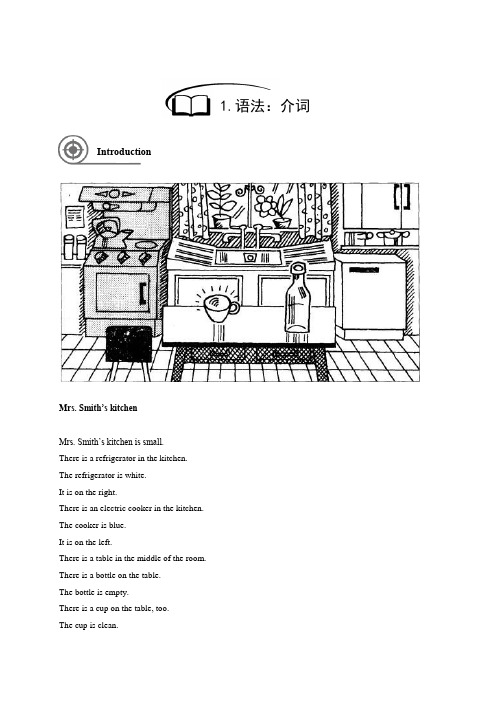
Mrs. Smith’s kitchenMrs. Smith’s kitchen is small.There is a refrigerator in the kitchen. The refrigerator is white.It is on the right.There is an electric cooker in the kitchen. The cooker is blue.It is on the left.There is a table in the middle of the room. There is a bottle on the table.The bottle is empty.There is a cup on the table, too.The cup is clean. 1.语法:介词IntroductionPresentation一、时间介词at, on, in 的用法1. at(1)表示具体时刻,如:at three o’clock在三点钟at half past eight在八点半(2)固定搭配:at noon at night at dawn at duskat the moment at first at the beginning at presentat last at sunrise at sunset at the age ofat the same time at dinner-time at the end of at Christmas2. on(1)表示具体某一天(包括节假日),如:on March 8th, 2016在2016年3月8日on Children’s Day在儿童节on Sunday在星期天(2)表示具体某一天的早、中、晚,如:on Saturday morning在周六早上on a rainy evening在一个下雨的傍晚on a hot afternoon在一个炎热的下午3. in(1)表示月份,季节,年,年代,世纪,如:in July在七月in summer在夏天in 2016在201年in the 1990s在20世纪90年代in the 21st century在21世纪in his twenties在他20多岁(2)后面跟一段时间,表示“…..之后”,指将来的时间,如:in a week 一周之后in a few months 几个月之后I’ll be back in a few minutes. 我几分钟后回来。
牛津版英语三年级知识点总结

牛津英语三年级知识点整理3A U1:Hello学习目标学习各种动物的英文词汇学习询问他人的姓名和介绍自己的名字根据叫声识别动物学习冠词a/an主要知识点●What's your name? 用来询问对方的姓名。
答复可以说:My name's…或者说:I'm…I'm…可以用来介绍自己的姓名。
●冠词a/an:a 用在以辅音因素开头的可数名词单词之前;an 用在以元音音素开头的可数名词单词之前。
3A U2:Nice to meet you学习目标学习各种颜色的表达。
学习交际用语:Nice to meet you.询问颜色:What colour is it?学习用“This is…〞来介绍人。
主要知识点●Miss 用于称呼未婚女士;Mr 用于称呼男性;Mrs 用于称呼已婚女士。
●初次与人见面,相互介绍以后,可以说:Nice to meet you. 表达很快乐认识对方。
答复可以说:Nice to meet you, too.●This is ... 可以用来介绍人。
比方:This is Helen. 这是海伦。
●What colour is it? 可以用来询问事物的颜色。
3A U3:This is my father学习目标学习各种水果的表达。
学习用“This is my... 〞来介绍家人。
学习句型:I can see a…/some…主要知识点●“This is my... 〞可以用来介绍家人。
my 表示“我的〞,是形容词性物主代词。
例如:This is my mother. 这是我的妈妈。
●I can see …〞表示“我能看到...〞。
例如:I can see a banana. 我能看到一支香蕉。
●表示一个人或事物,名词用单数,前面加不定冠词a/an。
如:an apple 一个苹果。
表示一个以上的人或事物,名词用复数。
some 可以用来修饰名词的复数。
如:some mangoes 一些芒果。
小升初英语语法【牛津深圳版(广州沈阳通用)】总复习:介词
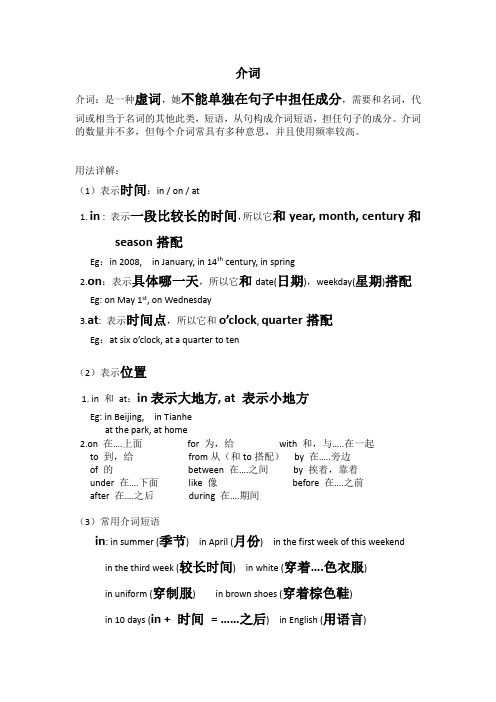
介词介词:是一种虚词,她不能单独在句子中担任成分,需要和名词,代词或相当于名词的其他此类,短语,从句构成介词短语,担任句子的成分。
介词的数量并不多,但每个介词常具有多种意思,并且使用频率较高。
用法详解:(1)表示时间:in / on / at1. in : 表示一段比较长的时间,所以它和year, month, century和season搭配Eg:in 2008, in January, in 14th century, in spring2.on:表示具体哪一天,所以它和date(日期),weekday(星期)搭配Eg: on May 1st, on Wednesday3.at: 表示时间点,所以它和o’clock, quarter搭配Eg:at six o’clock, at a quarter to ten(2)表示位置1. in 和at:in表示大地方, at 表示小地方Eg: in Beijing, in Tianheat the park, at home2.on 在….上面for 为,给with 和,与…..在一起to 到,给from从(和to搭配)by 在…..旁边of 的between 在….之间by 挨着,靠着under 在….下面like 像before 在….之前after 在….之后during 在….期间(3)常用介词短语in: in summer (季节) in April (月份) in the first week of this weekendin the third week (较长时间) in white (穿着….色衣服)in uniform (穿制服) in brown shoes (穿着棕色鞋)in 10 days (in + 时间= ……之后) in English (用语言)in time(及时)on: on May the first on my birthday on a winter dayon Tuesday morning(具体某一天)on New Year’s Day(节日)on time(准时) on TV(电视上) on foot(步行)on horse(骑马) at: at night(在夜间) at half past eleven(表时间) at the weekend(在周末) at home(在家) at zero(在零度)几个词组的区别In the tree:不是树木本身生长出来的东西,而是外在的东西挂在树上。
牛津2019英语英语-四年级-第2讲-介词
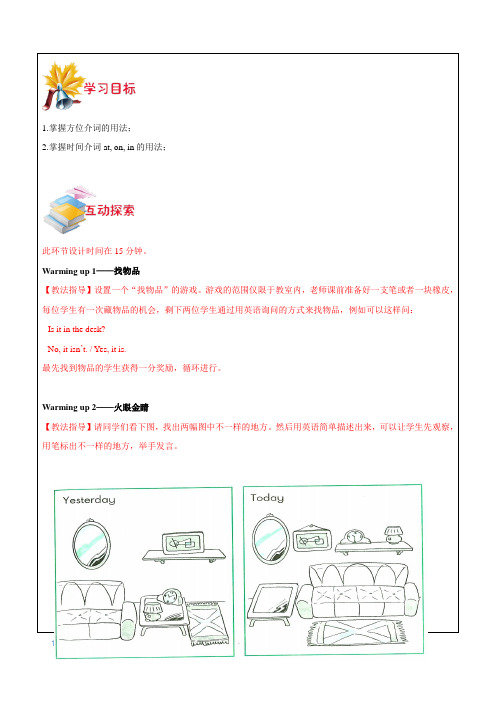
1.掌握方位介词的用法;2.掌握时间介词at, on, in的用法;此环节设计时间在15分钟。
Warming up 1——找物品【教法指导】设置一个“找物品”的游戏。
游戏的范围仅限于教室内,老师课前准备好一支笔或者一块橡皮,每位学生有一次藏物品的机会,剩下两位学生通过用英语询问的方式来找物品,例如可以这样问:--Is it in the desk?--No, it isn’t. / Yes, it is.最先找到物品的学生获得一分奖励,循环进行。
Warming up 2——火眼金睛【教法指导】请同学们看下图,找出两幅图中不一样的地方。
然后用英语简单描述出来,可以让学生先观察,用笔标出不一样的地方,举手发言。
此环节教案预期时间60分钟;【教法建议】老师利用身边的物件,引导学生学习方位介词。
可以先是师生互动,由老师摆放物体,学生一起说出方位介词,然后再生生互动,由一位学生摆放,由该学生指定其他学生回答。
——介词1. 基本方位介词2. 拓展方位介词【教法指导】老师讲解完图片,请学生自己总结,并完成下表。
在…..里面in 在两者中间between 在……上面on 在中间(三者或三者以上)among 在……后面behind 在….前面in front of 在……下面under 在树上(长在树上)on 在……旁边next to 在树上(站在树上)in靠近……near随堂练对话练习【教法指导】方式一:老师问,学生回答;方式二:一位学生问,两位学生答。
3. 时间介词at, in, on①at后常接几点几分;at five o’clock②in 后常接年、月、上午、下午、晚上;in Spring, in March, in 2012, in the morning, in the afternoon,③on 后常接星期、节日;on Sunday, On New Year’s Day基础题I. 用时间介词in,on,at填空______1999 _______Sunday _______the evening ________June ________the afternoon _______noon ______night ______ Children’s Day _______8 o’clock _______Summer答案:in on in in in at at on at in提升题()1. ---When did Hongkong return to our motherland?---____July 1st,1997.A. OnB. InC. AtD. For()2. I'd like a cup of coffee __________some sugar and milk.A. inB. toC. ofD. with()3.---Oh, so many people in the amusement park!--- Nobody likes to stay at home __ Sunday morning.A. inB. onC. atD. after答案:ADB——主题阅读范文赏析My favorite foodI eat different kinds of food every day. But apples are my favorite food .Apples are round,red and green.Some apples are sweet,others are sour.But they are very delicious. “An apple a day keeps doctors away.”So apples are good for our health. Let’s eat more apples to keep healthy.此环节教案预期时间20(练题)+15(互动讲解)分钟。
牛津版上海寒假英语四年级第2讲-介词

辅导讲义学员姓名:学科教师:年级:四年级辅导科目:英语授课日期时间主题介词学习目标1. 了解介词的基本概念2. 掌握介词的共同特征3. 掌握时间介词at, on, in的用法;教学内容1、上次课后巩固作业复习;2、互动探索一、介词at, in, on表示时间【知识梳理1】at表示时间【例题精讲】例1.at five o’clock (五点)例2. at noon (中午)【拓展】at dawn (黎明)/ at the beginning of the month (月初)【巩固练习】1. He always gets up_________ seven every morning.2. The sports meet will begin_________ 9:30.【Keys】at, at.表示具体的时刻,意思是在某一时刻,常接几点几分,天明,中午,日出,日落,开始等。
【知识梳理3】on表示时间表示具体某一天,意思是在……那天,常接某日,星期几,某日或某日的朝夕,节日等。
【例题精讲】例1. on Sunday (星期天)例2. on Christmas afternoon(圣诞节下午)例3. on October 1,1949(1949年10月1日)例4. on New Year’s Day (新年)【拓展】on a warm morning in April【巩固练习】1.We have seven classes_________ Monday.2.They play happily _________ Ch ildren’s day.【Keys】on, on.【巩固提高】第一组: 1). My father usually goes to work ________ 8:00.2). The party will begin ______ night.【Keys】at第二组: 1). We never go shopping ______ the evening.2). Days are long _________summer.【Keys】in第三组: 1). Christmas is __________ December 25th.2). What is the first lesson(课)________ Tuesday?3). Children don’t go to school _______ New Year’s Day.【Keys】on第四组: 1). The girl usually practices the piano ________ Saturday morning.A. onB. inC. at2). He never goes swimming __ _ a cold winter night.A. atB. onC. in【Keys】AB二、介词at, in, on表示地点【知识梳理1】at表示地点表示在某个地点,多指较小的地方,如商场、车站、家、学校等。
期末语法复习(知识清单)牛津上海版(试用本)英语四年级上册
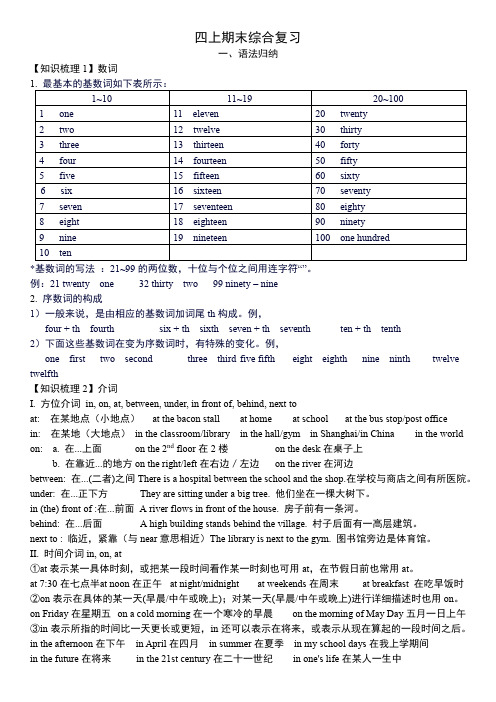
四上期末综合复习一、语法归纳【知识梳理1】数词*基数词的写法:21~99的两位数,十位与个位之间用连字符“”。
例:21 twenty one 32 thirty two 99 ninety – nine2. 序数词的构成1)一般来说,是由相应的基数词加词尾th构成。
例,four + th fourth six + th sixth seven + th seventh ten + th tenth2)下面这些基数词在变为序数词时,有特殊的变化。
例,one first two second three third five fifth eight eighth nine ninth twelve twelfth【知识梳理2】介词I. 方位介词in, on, at, between, under, in front of, behind, next toat: 在某地点(小地点)at the bacon stall at home at school at the bus stop/post officein: 在某地(大地点)in the classroom/library in the hall/gym in Shanghai/in China in the world on: a. 在...上面on the 2nd floor在2楼on the desk在桌子上b. 在靠近...的地方on the right/left在右边/左边on the river在河边between: 在...(二者)之间There is a hospital between the school and the shop.在学校与商店之间有所医院。
under: 在...正下方They are sitting under a big tree. 他们坐在一棵大树下。
in(the) front of:在...前面A river flows in front of the house. 房子前有一条河。
上海牛津版英语六年级第一学期6A期末复习知识点总结1

must not
必须、很重要或必要不准,不允许或禁止
Wemust study hard.
You mustn’t leave school alone.
提问
把情态动词单独提前
Must we wait foryou?Yes,youmust ; No,youneedn’t.(非mustn’t)
花钱花时间
.spen.tw.yua.o.thi.pen...spen.tw.yua.i.buyin.thi.pen.
I spend two yuan on this pen.=I spend two yuan in buying this pen.
表示提议的句型
Shall we
Shall是情态动词+接动词原形
a little
只能修饰不可数名词,a little milk.
some
a lot of plenty of
既可修饰可数名词又可修饰不可数名词。当及可数名词连用时,只能及可数名词的复数形式连用
k. Plent.o.eggs.
someeggs. a lot of milk. Plenty of eggs.
the one on the left/right , the one in the middle =the left/right/middle one.
地点、方位表述
near离**近
far(away)from离**(很)远
直接接地点
.liv.nea.school. H.live.fa.awa.fro.school.
六年级英语(上)知识点
频度副词
频度副词
always、sometimes、usually、never
牛津上海版六年级第一学期 — 介词专项讲解及练习

介词重点语法——方位介词课堂练习I .请描述以下图片家具的位置Question 1:What room is it? _____________________________________________ Question 2: Is there a lamp near the plant? __________________________________如果道路拥挤,就不要横穿马路。
11along沿着Walk along this street, then turn left, you cansee the post office.沿着这条街走,然后向右拐,你就可以看到邮局。
12up向上The monkeys climbed up the trees to pickthe bananas.猴子爬上树上去摘香蕉。
13down向下The ball is rolling down the hill.球正往山下滚。
Question 3: Where is the mirror? __________________________________________ Question 4: Is the cushion in front of the sofa? ________________________________ Question 5: How many shelves are there in the room? _________________________II. Fill in the blanks with the following prepositions.2.The sofa was ________ the shelf. Now it’s under the window. under3.The mirror is now ________ the two pictures. between4.Now the clock is ________ the round table. on5.Mary is my deskmate. She is sitting ________ me. beside6.–Where is the cat? I can’t see it. –It’s ________ the door. behind7.Let’s put the tea table ________ the sofa. in front of8.There is a lamp on the small table ________ the bed. next toIII.Read and judgeJohn is a Canadian. He lives in a tall building in the city of Toronto. There are 18 floors in the building. And he lives on the 15th floor. He uses a lift to go up and down. John works very hard. He goes to work early. Every day he gets out of the lift. Then he walks to a bus stop. The bus stop is in front of a station. It is about two hundred meters from his home. He usually catches the No.101 bus to work. But sometimes he goes by train. His work starts at half past eight, and finishes at a quarter to five. He gets back home at a quarter past five. He gets into the lift, and goes up to the 12th floor. Then he gets out ofthe lift and climbs up to the 15th floor on foot.( ) 1. John is from Canada.( ) 2. He lives on the 18th floor( ) 3. There is a station behind the bus stop.( ) 4. John always goes to work by bus.( ) 5. John’s factory is in front of a station.( ) 6. He works six hours a day.KEYS:TFTFFF课后练习I.用适当的介词填空。
小升初语法讲解介词(时间介词)专题训练(讲义)牛津上海版(试用本)英语五年级下册

小升初语法讲解介词(时间介词)专题训练(讲义)牛津上海版(试用本)英语五年级下册知识点讲解时间介词1.表示年、月、日、时刻等用at, in, on✓at 后常接几点几分,天明,中午,日出,日落,开始等。
●at breakfast / lunch / supper(在早餐时/午餐时/晚餐时)●at noon/night/midnight(半夜) at sunrise(日出时) at dusk(黄昏)at dawn/daybreak (黎明)E. g: We will leave at daybreak.我们将在黎明时动身。
He drinks tea at breakfast.他在早餐时饮茶。
✓on后常接某日,星期几,某周末的朝夕,节日等●on Sundays / weekdays on Monday morning / afternoon / evening【温馨提示】“在周末”既可以说at weekends,也可以说on weekends●on a cold afternoon on the night of October 1, 1997 on the first day●on Teachers’ Day on Christmas Day/Eve on National Day(用于公共节假日前)【温馨提示】at,on都可用来表示“节假日”,但at侧重指“休假的时节”,而不是指具体的哪一天;on侧重指具体的时日,与它连用的短语中多含“Day”at New Year(在新年期间) at Christmas (在圣诞节期间) on New Year’s Day(在元旦那天)on Christmas Day (在圣诞节)E. g: I often go fishing on/ at weekends.我经常在周末去钓鱼。
We didn’t listen to the lecture on Wednesday afternoon.周三下午我们没去听演讲。
on, under, in介词的用法 (牛津四年级英语精品课件)

沪教版牛津五年级(下)英语语法总复习 (OXFORD)
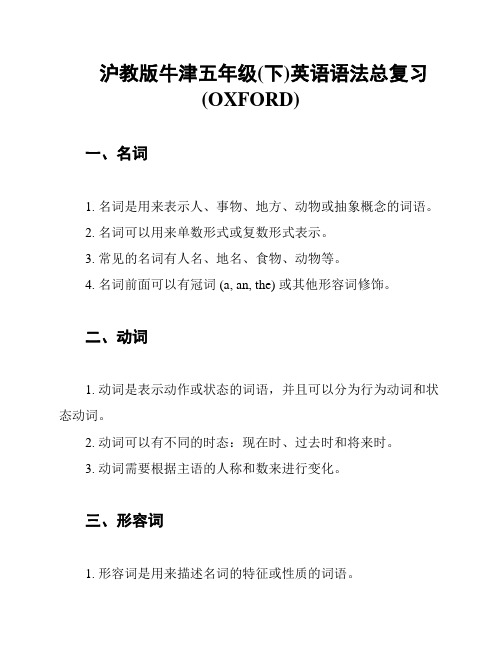
沪教版牛津五年级(下)英语语法总复习(OXFORD)一、名词1. 名词是用来表示人、事物、地方、动物或抽象概念的词语。
2. 名词可以用来单数形式或复数形式表示。
3. 常见的名词有人名、地名、食物、动物等。
4. 名词前面可以有冠词 (a, an, the) 或其他形容词修饰。
二、动词1. 动词是表示动作或状态的词语,并且可以分为行为动词和状态动词。
2. 动词可以有不同的时态:现在时、过去时和将来时。
3. 动词需要根据主语的人称和数来进行变化。
三、形容词1. 形容词是用来描述名词的特征或性质的词语。
2. 形容词通常用来修饰名词,用来给名词添加更多的信息。
3. 形容词在句子中通常位于名词之前。
四、副词1. 副词是用来修饰动词、形容词、副词或整个句子的词语。
2. 副词可以表示时间、地点、方式等不同的意义。
3. 副词一般位于动词或形容词之后,句子中的其他位置也可能出现。
五、代词1. 代词是用来代替名词或其他代词的词语。
2. 代词可以用来指代特定的人或事物,以避免重复使用名词。
3. 常见的代词有人称代词、物主代词和指示代词。
六、介词1. 介词是用来连接名词或代词与其他词语的词语。
2. 介词通常用来表示时间、地点、方式等不同的关系。
3. 常见的介词有 in, on, at, with, from, to 等。
七、连词1. 连词是用来连接词语、短语或句子的词语。
2. 连词可以用来连接并列的词语或句子,以及引导复合句等。
3. 常见的连词有 and, but, or, because, if, when 等。
八、冠词1. 冠词是用来限定名词的词语。
2. 冠词分为不定冠词 (a, an) 和定冠词 (the)。
3. 不定冠词用来表示泛指的意义,而定冠词用来表示特指的意义。
九、句子1. 句子是由单词和词组组成的表达完整意思的语言单位。
2. 句子可以分为陈述句、疑问句、祈使句和感叹句等不同类型。
3. 句子由主语和谓语构成,可以包含其他成分如宾语、定语、状语等。
- 1、下载文档前请自行甄别文档内容的完整性,平台不提供额外的编辑、内容补充、找答案等附加服务。
- 2、"仅部分预览"的文档,不可在线预览部分如存在完整性等问题,可反馈申请退款(可完整预览的文档不适用该条件!)。
- 3、如文档侵犯您的权益,请联系客服反馈,我们会尽快为您处理(人工客服工作时间:9:00-18:30)。
介词又叫前置词,是一种用来表示词不词、词不句之间关 系的词,它一般放在名词、代词(宾格)或动词(动词 ing形式)前面。
1、in ① 在……里面。如:in the classroom ② in+颜色,穿着……颜色的衣服。如:Who’s the man in white? ③ in+语言,用某种语言说。如:What’s this in English? ④ 在上午、下午、晚上。如:in the morning,in the afternoon, in the evening • ⑤ 在年、月、季节前。如:in 2008,in August,in summer • ⑥ 在国家、城市和较大的地方前。如:in China,in Wuxi,in the playground • ⑦ 固定搭配。 如:in the middle of(在……中间),do well in (擅长),in the day(在白天),take part in(参加),stay in bed(躺在床上),in the street(在街上) • • • • •
• • • • • • • • • • •
11、between 在两者之间 如:There are some trees between Building A and Building B. 12、by 乘某种交通工具 如:by bus,by plane,by the way(顺便说一下) 13、from ①be from = come from(来自……) 如:Mr Smiths is/comes from Australia. ②from…to…(从……到……)We go to school from Monday to Friday. 14、to 到、去…… 如:Let’s go to the zoo. 固定搭配:write to(给xx写信) 15、about 关于;大约 如: I want to buy a book about animals. It’s about one kilometer away.
• 3、at • ①在某个时刻前。如:at seven o’clock • ②在传统节日前。如:at Spring Festival,at Mid-Autumn Festival,at Christmas • ③在较小的地点。如:at the bus stop • ④固定搭配。如:at once(立刻,马上),be good at(擅 长……),look at(看),at home(在家),at school(在学校), at weekends(在周末), at the back of(在……后部), at night (在夜晚)
• 22、of ……的,属于…… 如:a map of China ,a map of the world • 23、off 离开,在……之外 如:keep off the grass(勿踏草坪), get off(下车) • 24、up 向上 如:stand up(起立),pull up carrots(拔胡萝卜) • 25、down 向下 如:sit down(坐下), jump up and down (上下跳)
• 4、under 在……下面 如:There is a cat under the table. • 5、behind 在……后面 如:There is an umbrella behind the door. • 6、near 靠近…… 如:There is a park near my house. • 7、beside 在……旁边 如:The students are standing beside the teacher. • 8、next to 紧靠……旁边 如:The teachers’ office is next to our classroom. • 9、before (时间上)在……之前 如: before class(上课前) • 10、after (时间上)在……之后;依照 • 固定搭配: after class(课后),after school(放学后),look after(照看),run after(追赶),read after me(跟我读)
• 2、on • ①在……上面。 如:on the desk • ②用在某一天(上、下午)前。如:on the 5th of May,on Sunday,on Monday morning • ③以Day结尾的节日前。如: on Children’s Day,on New Year’s Day • ④固定搭配。如:on foot(步行),on duty(值日),put on (穿上),get on(上车)turn on(打开),on the right / left (在右边/左边),on the wall (在墙上),on Zhongshan Road (在中山路上) • 注 意:树上长的水果用on the tree;丌是树上长的外来物用in the tree。 • 如:I can see a lot of apples on the tree. There is a boy in the tree.
• 18、in front of 在……前面 如:There is a tree in front of the classroom. • in the front of 在……前部 如:There is a blackboard in the front of the classroom. • 19、along 沿着,顺着 如:Go along this street. • 20、as 作为 如:What would you like as a birthday present? • 21、out of 从……出来;往……之外 如:The dog is running out of the house.
• 16、for 为、给…… 如:Here’s a letter for you. What’s for breakfast? • 固定搭配:look for (寻找),wait for(等候) • 17、with • ①不……一起。如:I’ll go shopping with my mother. • ②具有某种特征。如:Who’s the boy with big eyes? • ③help... with... 在某方面帮助某人 如: Can you help me with my English? • ④play with... 和……一起玩;拿……玩 如:play with me,play with a yo-yo
